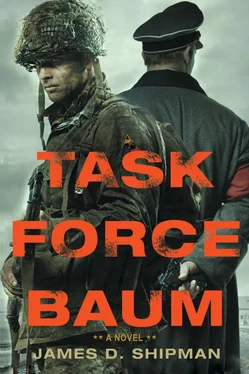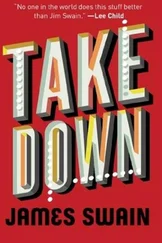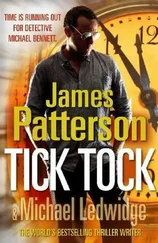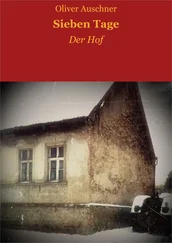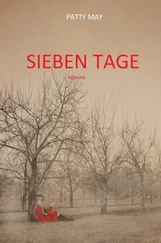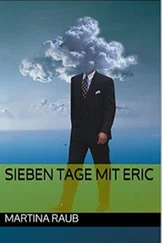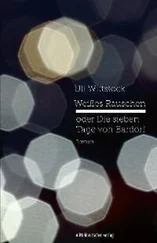The convoy drew closer, a few hundred yards away, then a hundred. Hall waited until the first truck passed him. He saw the surprise in the German’s face as the man looked closely at Hall.
Task Force Baum erupted in flame. Hall joined in, pumping rounds into the back of the nearest vehicle. The Germans jerked and jolted as they struggled to recover from the shock of the attack, but there was no chance. The last truck in line exploded in fire from a point-blank tank shell. Machine guns raked the enemy with fire.
Hall added his rounds to the melee. In short seconds, the Thompson was empty. He groped for another clip, but Stiller held him back. “That’s enough, Hall. They’re cooked.”
The lieutenant turned to watch the last moments of the fight. The nearest truck rolled to the right, angling sharply as it skidded down the embankment and twisted over on its back, wheels still turning. Hall wasn’t sure he had heard a single return shot. The entire enemy column was crumpled either on the road or in the ditch. He felt adrenaline coursing through him. Before Stiller could stop him, he slammed another clip into his weapon and leapt out of the Jeep, scrambling down the embankment and sprinting toward the smoking opening of the truck. He wouldn’t miss this time. He turned the corner to fire into the back but stopped short, his jaw dropping.
Golden braids spilled out of the back of the truck. A young girl stared out at him with lifeless eyes. Her white shirt was smeared with angry blood. He stared in horror inside the truck. He could hear the moans of wounded women. We’re killing girls . He turned, raising his hands, screaming at the column, but nobody could hear him. The firing continued, shell after shell ripping through the trucks. Hall fell to his knees, retching. He flung his Thompson aside, staring up at the smoking ruins filled with flaxen braids and death.
Hammelburg, Germany
March 27, 1945, 0800 hours
He listened in the receiver to the endless ringing on the other end. Koehl hung up on the thirteenth chime with no answer. He stared at the phone and then glanced at his watch. He couldn’t wait any longer. He’d called Gerta four times with no answer. She’s ignoring me , he realized. He’d hoped she was seeing clearly this morning and would head over to regimental HQ on her own. No matter. He’d swing by and pick her up later, assuming he was alive at the end of the battle. He chuckled to himself. What a strange world he lived in where plans depended on whether you died before you could implement them.
He pulled on his boots and strapped his belt into place, then pulled on his tunic and buttoned the heavy black wool jacket. He’d had time to launder his clothes, with the break in the fighting, but the fabric was worn and fading. He’d made an order for a new set, but the tailor informed him there was no fabric available. Another shortage that whispered ominously of the end.
Koehl stepped out of his room and on to the busy streets of Hammelburg. The winding road teemed with vehicles and personnel stomping hurriedly up and down the narrow sidewalks. There were few civilian pedestrians, he noticed, and no private vehicles of any kind. The sharp stench of diesel belched from gray and green leviathans lurching past. He turned to his left and walked a few hundred yards, weaving through the crowded mob, everyone seemingly convinced that their individual task was the most important. He arrived a few minutes later at an open, paved parking lot on the edge of the city. Waiting for him there were his machines and his crew—his family.
Six Panzerjager Tiger tank destroyers, nicknamed “Ferdinands,” were lined up in a neat row against a barbed-wire fence at the end of the lot. A massive 88mm main cannon jutted out of the rectangular fixed turret of each of them; its shells were made to crush the massive Russian armored tanks on the Eastern Front. The enormous, armored bodies of the machines were painted a green-and-brown camouflage. An MG 34 machine gun mounted in a ball casing in the front of the destroyers added an anti-infantry punch to these rolling weapons. The medium-sized, medium-armored Shermans used by the Americans were no match for his tank destroyers, which could punch a hole through the enemy vehicles with one well-aimed shot.
Still, gradually over time, he’d lost four of his beloved crews while fighting in France and Germany. Two had fallen to mechanical failures, and two succumbed to attacks by multiple Shermans at the same time. He’d pushed his regimental commander for replacements. His colonel did everything he could, but there were no new machines available. Perhaps in the spring there would be something, but for now, he would have to make do with his dwindling force.
As he walked toward his machines, his command sergeant stepped out to meet him. Feldwebel Heidrich Schmidt gave Koehl a welcoming grin, looking up at his commander with eyebrows raised knowingly behind thick glasses. The Hauptmann grasped his hand, and he pulled Schmidt away from the group.
“Is everything ready?” asked Koehl.
“Everything but the petrol.”
Koehl frowned. “Hoepple told me he had enough for us here.”
“That may be, but I haven’t seen it yet. Did you reach Gerta?”
Koehl shrugged. “No answer.”
“Don’t worry, my friend. I’m sure she’s fine. She’s probably put out with you over your little surprise last night. By the time we’re done with our little party, she’ll be ready to come. If not, I’ll go with you, and we’ll nab her right out of her bed.”
“She won’t appreciate that,” said Koehl, laughing.
“We don’t get everything we want in life.”
“Can you do me a favor?”
“I suppose so, but you’ll owe me.” The sergeant’s eyes twinkled.
Koehl sighed dramatically. “A million NCOs in the Wehrmacht and I get landed with you.”
“I told you how lucky you are. That’s why you’ve survived so long.”
They shared a laugh. Koehl appreciated the chance for humor. If they truly let everything they’d seen and done get to them, they would have only room to despair.
“You’re pulling me off track. I need you to go check on the petrol. I thought it would be here.”
“Fine. I was going to enjoy one of our delicious supply of field rations, but I suppose it can wait. I’ll check in and find out what I can.” He finished his statement with a grossly embellished bow.
“You’re impossible. Just go find my fuel.”
The sergeant departed, and Koehl spent the time waiting, huddled over a map, double-checking routes in and out of the ambush zone he and Hoepple had selected. He liked what he saw. Good highways in and out, and an excellent place to delay the Americans, at least for a time. If they had petrol, that is. And if his infantry showed up as promised, with engineers and explosives. A lot of uncertainties. More than he liked for an operation under his control.
A half hour later, Sergeant Schmidt returned. Koehl could tell by his reluctant gait that he carried unwelcome news. “What is it?” he asked.
“There’s no more petrol. Hoepple says he is sorry, but the rest of his reserves were taken early this morning by Division. Something about needing more stockpiles. It was done without his knowledge.”
“What the hell for? The war is here and now!”
“You know those bastards at Division. No rhyme or reason for what they do.”
Koehl was exasperated. How could he do his job without petrol? What did the bastards at headquarters need it for? To warm their asses? He felt the anger burning through him.
“Well, damn them all. They tell me not to get killed out there, then rob me of what I need to survive.” Koehl shrugged. “Well, we have to try.” He turned to Schmidt. “Do we have enough petrol to get to the ambush site at least?”
Читать дальше
